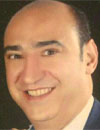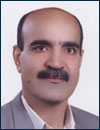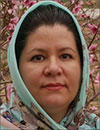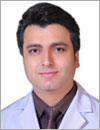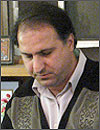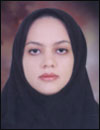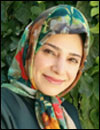
Atopic dermatitis
دکتر ظهیر عباس [ متخصص پوست ، مو و زیبایی ]آدرس وب سایت : www.drzaheerabbas.comآدرس مطب : کشور عمان تلفن مطب : 33683931 - 076
What is natural eczema (atopic dermatitis)?
Atopic eczema is an itchy and chronic skin condition that can affect any part of the body and is more common in urban people with dry climates. This disease has different symptoms at different ages. Dry skin is a hallmark of atopic dermatitis. If left untreated, bacterial infections can spread to the patient's skin and worsen symptoms. Although the disease can occur after menopause, 85% of cases start under the age of 5 and usually in 60% of cases, it improves spontaneously before the age of 12, and in other cases in various forms such as hand eczema, eczema Eyelids, contact eczema, etc., suffer from this disease for the rest of their lives.
What are the symptoms of this disease?
In the form of itchy skin lesions, which are usually dry and red, but in acute cases may be secreted. The word atopic refers to a group of allergic diseases that often affect several members of a family and 72% of cases are inherited. Allergies such as seasonal allergies to rhinitis or asthma or natural eczema are seen in these families.
What can make this disease worse?
Some factors such as rapid changes in ambient temperature, polarity, infections, dry air, heavy sweating, clothing wear and nervous stress can exacerbate the disease. In some children with the disease, some foods may also exacerbate eczema lesions, the most common of which are eggs, cow's milk and its products, nuts, especially peanuts and soy. These foods may exacerbate eczema lesions, meaning they are not the main cause of the disease. The important point is that for a growing child, there should be no unreasonable dietary restrictions.
How is this disease diagnosed?
Diagnosis of this disease is based on the history and examination of a dermatologist. There is a wide range of atopic dermatitis or eczema. It can be just a brief dry rash on the cheeks or diffuse and severe throughout the body. There can be varying degrees of skin involvement between the two. If your patient has a severe and widespread form of the disease, do not worry, there is a cure for these cases as well.
What precautions should be taken to prevent recurrence and exacerbation of the disease?
1- The bathing of these children should be short. Use lukewarm water. Dry the skin gently and gently after bathing.
2- Take less baths (2 or 3 times a week) to prevent excessive dry skin. Soap and water may make the disease worse. When bathing, use special non-greasy soaps (pens). Do not use soap on inflamed areas.
3- Apply a soft and moisturizing cream or lotion immediately after bathing.
4- Wearing loose cotton and linen clothes to help absorb sweat.
5- Minimize stress and tension as much as possible.
6- Regular trimming of nails. Note that scratching makes eczema worse. Avoid exposure to extreme temperature changes (cold or extreme heat).
8- Avoid anything that has made the disease worse before, for example, getting worse due to eating certain foods)
9- Avoiding contact with some substances in the air as well as dust because this can significantly cause relief and alleviate symptoms. Dust and objects that hold dust (such as pillows, pillows, cushions, curtains, rugs, sofas, some toys and wool) can make the disease worse. Therefore, the living space should be simple and free of dust accumulation.
10 - Cosmetics, perfumes, sprays (insecticides and fragrances) and cigarette smoke can aggravate eczema and contact with them should be avoided.
11- Although the easiest and most available medicine to control skin lesions is corticosteroid ointments, it is better to always use these ointments under the supervision of a dermatologist. It has been observed that parents use corticosteroid ointments for their children on their own, which is wrong because these ointments have side effects when not used correctly. The side effects of these drugs can be managed and prevented if taken under the supervision of a dermatologist, especially since it is necessary to use these drugs for a long time.
نسخه اصلی مطلب Atopic dermatitis را در سایت دکتر ظهیر عباس بخوانید.اثرات تزریق بوتاکس در لیفت شقیقه، ابرو و رفع افتادگی پلک
دکتر پارسا نوایی [ پوست ، مو و زیبایی ]
 کاشت ابرو به روش FIT چیست و چگونه انجام می شود؟دکتر سهیلا طاهری [ متخصص پوست و مو ]
کاشت ابرو به روش FIT چیست و چگونه انجام می شود؟دکتر سهیلا طاهری [ متخصص پوست و مو ]روش FIT برای کاشت مو؛ همه اطلاعات کاربردی و پاسخ به سوالات متداولدکتر سهیلا طاهری [ متخصص پوست و مو ]
فیزیوتراپی در بیماران سکته مغزی با چه اهدافی انجام میشود؟دکتر سلمان فلاح [ متخصص طب فیزیکی و توانبخشی ]
مزایای تشخیص پوکی استخوان با عکس رادیولوژی در منزلآقای امید ترکاشوند [ خدمات پزشکی در منزل ]
رابطه بین بیماریهای مقاربتی و تاثیر آنها بر سلامت باروری مرداندکتر عنایت الله ایزدی [ متخصص کلیه و مجاری ادراری ]
تزریق بوتاکس برای از بین بردن خطوط خرگوشی روی بینیدکتر پونه دورودی [ کوچینک سلامت و زیبایی ]
همه چیز در مورد عفونت قارچی ناخندکتر جمال الدین حسن زاده [ متخصص پوست و مو ]
درمان سرطان سینه به روش ایمونوتراپیدکتر سید محمد رضا حکیمیان [ بورد جراحی و فلوشیپ جراحی سرطان ]
عمل برگشت وازکتومی چیست و چگونه انجام می شود؟دکتر مجید حقیقت [ متخصص کلیه و مجاری ادراری ]
روشهای از بین بردن و تخلیه چربی اضافه پلکدکتر فاطمه عندلیب [ متخصص پوست و مو ]
ژل روان کننده واژن؛ بهترین روان کننده برای رابطهدکتر زهرا صابری [ متخصص زنان و زایمان ]
لیزر Co2 فرکشنال برای درمان منافذ باز پوستدکتر رضا رباطی [ متخصص پوست و مو ]
آیا استفاده از دهانشویه برای کودکان مناسب است؟دکتر نیلوفر فلاح [ متخصص دندانپزشکی کودکان ]
معجزه میکرونیدلینگ برای صورتدکتر مینا دادگر [ پوست ، مو و زیبایی ]
همه چیز درباره مزوتراپی؛ مزایا ، عوارض و قیمتدکتر اکبر مزروعی [ پوست ، مو و زیبایی ]
همه چیز در مورد عمل جراحی پروتز گونهدکتر شهریار لقمانی [ فوق تخصص جراحی پلاستیک ]
اهمیت فیزیوتراپی برای بیماران سکته مغزی در منزلآقای امید ترکاشوند [ خدمات پزشکی در منزل ]
چگونه ماندگاری تزریق بوتاکس را افزایش دهیم؟دکتر اکبر مزروعی [ پوست ، مو و زیبایی ]
آسیب نخاعی و تاثیرات آن بر باروری مرداندکتر عنایت الله ایزدی [ متخصص کلیه و مجاری ادراری ]
عمل واژینوپلاستی با لیزر؛ مزایا، مراحل انجام و کاندیدای مناسبدکتر زهرا صابری [ متخصص زنان و زایمان ]
اوزون تراپی شانه یخ زده یا منجمد؛ مزایا، معایب و کاندیدای مناسبدکتر سلمان فلاح [ متخصص طب فیزیکی و توانبخشی ]
مزایا و معایب تزریق نانوفت برای جای جوشدکتر پونه دورودی [ کوچینک سلامت و زیبایی ]
